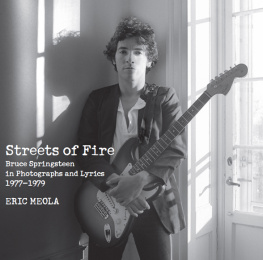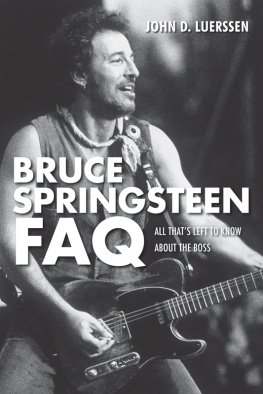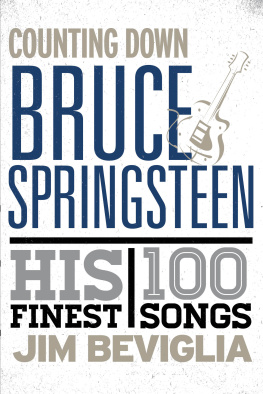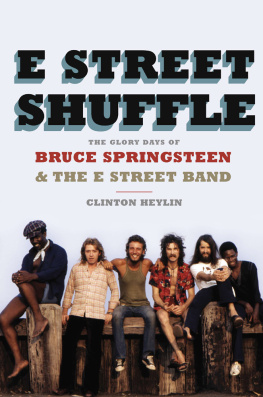Also by Clinton Heylin
E Street Shuffle: The Glory Days of Bruce Springsteen and the E Street Band
VIKING
Published by the Penguin Group
Penguin Group (USA) Inc., 375 Hudson Street,
New York, New York 10014, U.S.A.
Penguin Group (Canada), 90 Eglinton Avenue East, Suite 700, Toronto, Ontario, Canada M4P 2Y3 (a division of Pearson Penguin Canada Inc.)
Penguin Books Ltd, 80 Strand, London WC2R 0RL, England
Penguin Ireland, 25 St. Stephens Green, Dublin 2, Ireland (a division of Penguin Books Ltd)
Penguin Group (Australia), 707 Collins Street, Melbourne, Victoria 3008, Australia (a division of Pearson Australia Group Pty Ltd)
Penguin Books India Pvt Ltd, 11 Community Centre, Panchsheel Park, New Delhi 110 017, India
Penguin Group (NZ), 67 Apollo Drive, Rosedale, Auckland 0632, New Zealand (a division of Pearson New Zealand Ltd)
Penguin Books (South Africa), Rosebank Office Park, 181 Jan Smuts Avenue, Parktown North 2193, South Africa
Penguin China, B7 Jiaming Center, 27 East Third Ring Road North, Chaoyang District, Beijing 100020, China
Penguin Books Ltd, Registered Offices:
80 Strand, London WC2R 0RL, England
First published in 2012 by Viking Penguin,
a member of Penguin Group (USA) Inc.
Copyright Clinton Heylin, 2012
All rights reserved
In Great Britain this work appeared in Clinton Heylins E Street Shuffle (Constable & Robinson).
No part of this book may be reproduced, scanned, or distributed in any printed or electronic form without permission. Please do not participate in or encourage piracy of copyrighted materials in violation of the authors rights. Purchase only authorized editions.
Contents
These notes provide commentary on the 300 songs written by Springsteen in the twelve years (to the day) that separate his audition for Appel in February 1972 from the recording of Dancing In The Dark in 1984. Included is full studio data for each track, culled primarily from Sonys own database of the sessions, and where applicable the first documented live version. Session dates in square brackets indicates a possible mix session, as opposed to a full recording session with the band. In the case of certain early compositions, a second documented live version is included in brackets, to indicate where the first recording may be sonically challenged (i.e. crap). The short codes for the album on which a given track appears are as follows:
18TR 18 TRACKS
BITUSA BORN IN THE USA
BTF BEFORE THE FAME
BTR BORN TO RUN
DA DARKNESS ON THE EDGE OF TOWN
GH GREATEST HITS
GR GREETINGS FROM ASBURY PARK
NE NEBRASKA
PS PRODIGAL SON
RI THE RIVER
TE THE ESSENTIAL...
TP THE PROMISE
TR TRACKS
WI THE WILD, THE INNOCENT & THE E STREET SHUFFLE
[TR]* and [TP]* indicate that the original studio recordings were overdubbed decades later, prior to release on Tracks or The Promise.
Part One: 19721978
I) 117. Songs demoed in 1972, but not recorded for Greetings:
1. IF I WAS THE PRIEST
Known studio/demo recordings: Mike Appels Office, New York April 1972; John Hammond session, CBS Studios, New York 3/5/72; Pocketful of Tunes Studio, New York MayJune 1972. [BTF]
Remarkably, given the plethora of archival releases in recent years, If I Was The Priest still remains unreleased by Sony. Reportedly performed at The Student Prince in the fall of 1971, it is the song that opened the door to a new world of singer-songwriting for the young Jersey devil. As one of the songs that convinced John Hammond Senior the boy deserved a record contract, and as the one track demoed in 1972 which directly led to a pre-fame cover version by The Hollies Allan Clarke one might have expected its official appearance before now. As it is, its only quasi-legal release was on the Before The Fame 2-CD set which Springsteen went to such trouble to put out of circulation.
2. SOUTHERN SON
Known studio/demo recordings: John Hammond session, CBS Studios, New York 3/5/72; Pocketful of Tunes Studio, New York MayJune 1972. [BTF]
This weird little ballad about a displaced child of the Union remains one of just two tracks Springsteen played to Hammond at his May 3 CBS audition that were not worthy of consideration for his debut album. One of that small body of cowboy songs he wrote during or shortly after his trip to California, there isnt a great deal separating the Laurel Canyon demo from the Hammond demo. It was the former which first passed into collector circles, via the so-called London publishing demo.
3. RANDOLPH STREET
Known studio/demo recordings: Jim Cretecos apartment, New York April 1972. [BTF/PS]
One of half a dozen songs Springsteen recorded at the apartment of Jim Cretecos, Appels partner, in the weeks before he made a proper demo tape with John Hammond, Randolph Street was not a song anyone else was likely to cover. [See discussion in main text p. 4]
4. BABY DOLL
5. BORDER GUARD
6. WAR NURSE*
7. JESSE*
8. HOLLYWOOD KIDS
Known studio/demo recordings: Jim Cretecos apartment, New York April 1972. [BTF], * also [PS]
These five songs not one of which reappeared post-Hammond, even as a publishing demo fully testify to the then-output of this prodigious son, though such fecundity came at a price: quality control. Baby Doll, the oldest of these songs, was the one which failed to impress Appel at their November 1971 meeting. It may not be as bad as Appel has suggested, but nor is it Pinball Wizard (baby doll is playing at being deaf and dumb). The messianic Jesse is half a good idea (Oh Jesse, he says you wear a cross round your neck and come on with nails in your hands), but at no point does Springsteen figure out what sets the lad apart from other false prophets. Similar flaws impair Springsteens paeans to the Border Guard, the War Nurse and the Hollywood Kids. One somehow doubts Cretecos thought this home-tape would yield its own payday twenty years down the line, when any scraps could be served up as lost songs of The Boss.
9. PRODIGAL SON
Known studio/demo recordings: Jim Cretecos apartment, New York April 1972. [BTF/PS]
Long-rumoured to be an important early song, Prodigal Son was one of the major finds among the pre-Hammond tapes served up on the 2-CD set of the same name in 1994, before the injunctions started a-flyin. It would be superseded by Lost In The Flood when it came time to get serious.
10. FAMILY SONG
11. CAMILLA HORN
12. ELOISE
13. MARIE
Known studio/demo recordings: Pocketful of Tunes Studio, New York AprilMay 1972. [BTF/PS]
The least consequential song from another batch of demos turns out to be the most intriguing. Eloise, or the extant one-minute snatch which provides the gist of another girl-name song, is not only sufficient to reveal another lyric about an all-seeing woman whose power late in the night... comes over me, but also the melodic template for what will become Growin Up. Of the other three songs cut here, Springsteen and/or Appel evidently rated Marie the highest, as only this cut made the London publishing demo. [See discussion of Family Song in main text p. 42]
14. SHES LEAVING
15. THE SONG (I HEARD THE WORD)
Known studio/demo recordings: Pocketful of Tunes Studio, New York MayJune 1972.
Two more songs which feature on the London publishing demo, making them well known to the bossmans collecting fraternity. More surprisingly, neither appeared at the










